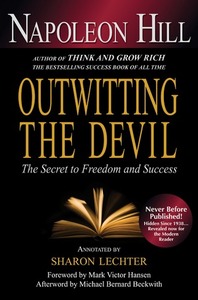Take a photo of a barcode or cover
115 reviews for:
Outwitting the Devil: The Secret to Freedom and Success
Sharon L. Lechter, Napoleon Hill, Mark Victor Hansen, Michael Bernard Beckwith
115 reviews for:
Outwitting the Devil: The Secret to Freedom and Success
Sharon L. Lechter, Napoleon Hill, Mark Victor Hansen, Michael Bernard Beckwith
I really enjoyed this book. Hill reveals what he believes to be the secrets to success, and honestly they’re quite radical for his time, and even today seems a little extreme. I would recommend this book for anyone capable of having an open mind and ability to question whether you agree with the ideas or not. Some people may absolutely love this book agreeing with every single concept and others may be utterly baffled and even disgusted with Hill’s approach.
The reason I’m only giving 3 stars is because of the lack of editing and repetitiveness. The authors mention they released the manuscript exactly as it was written back in the 1930s and added some commentary but did not change any of the original wording. Its’s also a really strange book that wasn’t written in a way to appeal to the masses.
In the end there were some really great nuggets that are worthy of some deep reflection that will likely have a positive impact on your life.
The reason I’m only giving 3 stars is because of the lack of editing and repetitiveness. The authors mention they released the manuscript exactly as it was written back in the 1930s and added some commentary but did not change any of the original wording. Its’s also a really strange book that wasn’t written in a way to appeal to the masses.
In the end there were some really great nuggets that are worthy of some deep reflection that will likely have a positive impact on your life.
If you’re looking for how to be successful, be faced with some sharp truths and see society from a different perspective READ THIS BOOK.
So to recap Napoleon Hill is the author of Think and Grow Rich, and is a father of that entire genre of books. He also apperently had many experiences people would call religious including a long conversation where he makes the devil confess the tricks of his trade, how he tricks people into wasting their life and how one can avoid the devils clutches and live a healthy productive and successful life. This books is the transcript of that conversation along with some preamble about the authors other religious experiences.
Now the first before covering the review is: does the author really think he is talking to a literal devil or is this just a parable for our metaphorical inner psychological demons which the author has talked to through his overactive imagination. Ultimately though I don't think it really matters since the two have identical effects upon us.
Now the actual review:
On the plus side the devils advice for success is pretty sound. Having faith and persevering through adversity, having a goal one keeps working towards, thinking for one self, bucking societies attempts at control. All is incredibly sound advice that I think many people would benefit from.
On the other side the author is being played like a fiddle and it was absolutely fascinating to watch, really. I would recommend this book more as a master class in manipulation than for the success advice which later authors have I think done much better. The devil plays to his life long wish to be among the elect. While being totally honest on the issues the author thinks are important it slips in a few small lies and many many implications to suggest that anyone who is the upper 2% that is "free from the devils grasp" are all wealthy captains of industry, the sort of people the author idolizes. And anyone who is poor, unattractive, or infirm; these people are all slaves of the devil. Further the devils tells him that most are physically incapable of being freed, at one point saying that such "drifters" lack free will or a human consciousness anymore. That they are contemptible and should in all cases be shunned. In fact the final advice from the devil is that true free thinkers should isolate themselves from the masses and only associate with other "free thinkers" who think just like them. The ungodly poor however are really only useful as employees or sources of money, they are only resources.
But of course all of this is built up ever so slowly in implications, off topic remarks that are ignored to get back on track, subtle proof always based not on evidence but on the authors wish to believe it, and all of it plays directly to the author (and many americans) Calvinist beliefs in the special, the holy, the elect few. And always with the devil stroking the authors ego indirectly through praising his idols of wealth, combined with more obvious direct praises that the author calls out so that Hill will feel he is on top of and wise to the game being played. Though I did think the regular "Damn you for compelling the truth from me, mortal! These secrets I am divulging will ruin me if they get out." to be so over the top I am quite surprised the author didn't call bullshit or at least get a little suspicious at the whole, "I can not tell a lie because your mind is to powerful and conquered all fear" shtick.
Now the first before covering the review is: does the author really think he is talking to a literal devil or is this just a parable for our metaphorical inner psychological demons which the author has talked to through his overactive imagination. Ultimately though I don't think it really matters since the two have identical effects upon us.
Now the actual review:
On the plus side the devils advice for success is pretty sound. Having faith and persevering through adversity, having a goal one keeps working towards, thinking for one self, bucking societies attempts at control. All is incredibly sound advice that I think many people would benefit from.
On the other side the author is being played like a fiddle and it was absolutely fascinating to watch, really. I would recommend this book more as a master class in manipulation than for the success advice which later authors have I think done much better. The devil plays to his life long wish to be among the elect. While being totally honest on the issues the author thinks are important it slips in a few small lies and many many implications to suggest that anyone who is the upper 2% that is "free from the devils grasp" are all wealthy captains of industry, the sort of people the author idolizes. And anyone who is poor, unattractive, or infirm; these people are all slaves of the devil. Further the devils tells him that most are physically incapable of being freed, at one point saying that such "drifters" lack free will or a human consciousness anymore. That they are contemptible and should in all cases be shunned. In fact the final advice from the devil is that true free thinkers should isolate themselves from the masses and only associate with other "free thinkers" who think just like them. The ungodly poor however are really only useful as employees or sources of money, they are only resources.
But of course all of this is built up ever so slowly in implications, off topic remarks that are ignored to get back on track, subtle proof always based not on evidence but on the authors wish to believe it, and all of it plays directly to the author (and many americans) Calvinist beliefs in the special, the holy, the elect few. And always with the devil stroking the authors ego indirectly through praising his idols of wealth, combined with more obvious direct praises that the author calls out so that Hill will feel he is on top of and wise to the game being played. Though I did think the regular "Damn you for compelling the truth from me, mortal! These secrets I am divulging will ruin me if they get out." to be so over the top I am quite surprised the author didn't call bullshit or at least get a little suspicious at the whole, "I can not tell a lie because your mind is to powerful and conquered all fear" shtick.
informative
inspiring
reflective
slow-paced
Nothing really remarkable or new here. Should have been published when Hill wrote it as it lost most of its allure by stating what now is pretty common sense/obvious. Language and format are outdated, but overall quick read.
funny
informative
reflective
medium-paced
This was a very interesting concept which became redundant. It's written during the Great Depression, when Hill has already written "Think and Grow Rich" and is well-known worldwide, and then he loses everything and has to discover whether any of the things he wrote about and taught actually work. He taps into his "Other Self," which to me sounds like God, and with His/its direction, he takes some seemingly absurd leaps of faith that work out perfectly. Then the second part of the book involves an interview with the Devil. He, apparently, believes he actually had a spiritual conversation with the Devil, and in a courtroom drama of sorts, he forces the Devil to tell him all his dastardly plans of how he "gets" people. Ultimately, the Devil tells him that he convinces people to become drifters, meaning that they have no definite aims in life, nor definite thoughts. The Devil is the negative forces in nature (including the electron!), and he fills in the vacuum the drifters leave behind. His nemesis is any thinking man, but he claims this comprises only 2% of the world's population. All theological differences aside, the concept is fascinating. But it goes on and on, and doesn't really seem to say anything new beyond that. Interesting, because Hill thought his ideas were so controversial that his wife made him promise not to publish the book in his lifetime. Hill died in 1970 and the book was only just published in 2011!
It’s a pretty great book but wildly repetitive and the annotations by Sharon Lechter only contribute to the repetition. Regardless, it’s worth the read. The thesis is worth dealing with feeling like you’re being talked down to more than necessary.
I'm a big fan of Napolean Hill and this book started off really well, but I found it painful to finish. There are sections that are amazing and really shows how ahead of his time he was, but there are parts that drag on. Not my favorite book by him.



